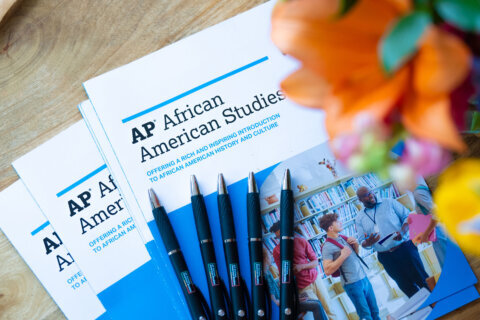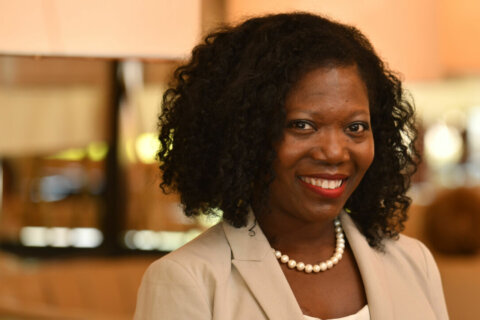This story is part 2 of a 3-part WTOP special report on how the new Advanced Placement African American Studies course is being taught at high schools in the D.C. area. Part 3 will be available Friday, May 17.
This video is no longer available.
Michael Hunt was ecstatic when he learned that Clarksburg High School in Maryland would be offering an AP African American studies course this school year.
He’s been teaching some variation of African American history for at least 25 years, and was set to retire at the end of the last school year before he opted to postpone his retirement a year, just to have the chance to teach the pilot course.
Students jumped at the chance to take the class, which Hunt called “40 years overdue.”
When it was first introduced, there was enough demand to warrant two sections of the course, something Hunt said was unexpected. But the school opted for one section of the class this year, and is planning on two sections for next year, giving about 60 students the chance to take it.
In Montgomery County, the course was also offered at Gaithersburg High, Northwest High and Paint Branch High School.
Since the class rolled out, students taking it are getting the chance to dive deeper into topics that they may only briefly learn about in other courses.
Hunt said it’s also increasing in popularity across the country, providing students who are usually underrepresented in Advanced Placement classes access to the college-level course.
“African Americans are underrepresented in AP courses,” Hunt said. “Hispanic students are underrepresented in AP courses. This course is actually going to fill that gap. … It actually allows those students to realize that they’re capable of taking on courses — high-level, engaging courses — and being successful in them.”
Hunt attended a summit at Howard University to collaborate with and talk to other teachers about how they planned to approach teaching the class. He knew he wanted to take students beyond the textbook and make it meaningful.
This year, students have taken field trips to places such as the Sandy Spring Slave Museum. They executed a cultural potluck, in which they brought in foods from Africa and heavily populated African American regions around the country. Some students took extra steps, such as visiting HBCUs.
In Hunt’s class, about 60% of students are female. He said they wanted to learn more about what women contributed and scarified throughout Black history.
“When you actually talk to many of our students, the most African American history they get is during Black History Month,” Hunt said. “And what they are most familiar with is the ‘I Have a Dream’ speech by Martin Luther King. That’s usually the gist of most of their knowledge about African American history.”
Students who take the class, Hunt said, “will actually have a clearer understanding of the African American experience in America.” It has four units and covers over 400 years.
Critics of the course across the country say they are worried about how it would make students feel. Those with concerns, Hunt said, should sit in a classroom to see the course in action.
“I’ve heard the rhetoric about the course,” Hunt said. “That we’re making white children feel guilty about slavery, which they weren’t a part of, and African American children feeling inferior because they are descendants of slaves. That’s not our experience. What I’m hearing is this course is actually clearing up a lot of the miscommunication, miseducation.”
Hunt considers the class a “jewel” and anticipates it will continue to grow in popularity.
“I wish many of our students had it years ago, but I’m really happy we have it now,” Hunt said.
Get breaking news and daily headlines delivered to your email inbox by signing up here.
© 2024 WTOP. All Rights Reserved. This website is not intended for users located within the European Economic Area.








